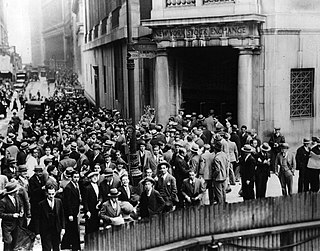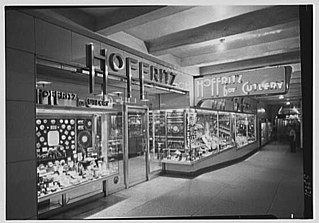
Macy's is an American department store chain founded in 1858 by Rowland Hussey Macy. It has been a sister brand to the Bloomingdale's department store chain since being acquired by holding company Federated Department Stores in 1994, which renamed itself Macy's, Inc. in 2007. It is the largest department store company by retail sales in the United States as of 2015.

Broadway Stores, Inc., was an American retailer based in Southern California. Known through its history as Carter Hawley Hale Stores and Broadway Hale Stores over time, it acquired other retail store chains in regions outside its California home base and became in certain retail sectors a regional and national retailer in the 1970s and 1980s. The company was able to survive takeover attempts in 1984 and 1986, and also a Chapter 11 bankruptcy filing in 1991 by selling off most of its assets until August 1995 when its banks refused to advance enough additional credit in order for the company to be able to pay off suppliers. At that point, the company sold itself to Federated Department Stores for $1.6 billion with the acquisition being completed on October 12, 1995.
Tower Records is an international retail franchise and online music store that was formerly based in Sacramento, California, United States. From 1960 until 2006, Tower operated retail stores in the United States, which closed when Tower Records filed for bankruptcy and liquidation. Tower Records was purchased by a separate entity and was not affected by the retail store closings.

Kaufmann's was a department store that originated in Pittsburgh, Pennsylvania.
Bonton Holdings Inc. operating as Bonton was an American department store chain and group founded in 1898. The former York, Pennsylvania-based company BonTon filed for bankruptcy in February 2018 and sold the name to CSC Generation, which sold it to BrandX.com in 2021, operating an e-commerce site under the brand name. Along with Bergner's, Boston Store, Carson's, Elder-Beerman, Herberger's, and Younkers, the names of most of the defunct retail group's department store chains are owned by BrandX.

Brentano's was an American bookstore chain with numerous locations in the United States.

Garfinckel's was a prominent department store chain based in Washington, D.C. that catered to a clientele of wealthy consumers. Its flagship store at 14th and F in the city's F Street shopping district is listed on the National Register. It filed for Chapter 11 bankruptcy in June 1990 and ceased operations that year.

Kroch's and Brentano's was the largest bookstore in Chicago, and at one time it was the largest privately owned bookstore chain in the United States. The store and the chain were formed in 1954 through the merger of the separate Kroch's bookstore with the former Chicago branch of the New York-based Brentano's bookstore. The chain was closed in 1995 after suffering financial losses from increased competition.

The Marbridge Building is an office building at 1328 Broadway, on the east side of Sixth Avenue between 34th and 35th Streets in Herald Square, Manhattan, New York City. It opened in 1909, an 11-story structure, utilized in part by men's clothier Rogers Peet. Until October 1910 it stood opposite the Alpine apartment house, which was at the northeast corner of Broadway and 33rd Street. The Alpine and old stores between 33rd and 34th Streets were demolished to make room for the $5,000,000 Hotel McAlpin near the end of 1910. On the other side of Broadway were located the Macy's Herald Square and Saks Incorporated stores, with the Gimbels store just below.
The Paris Decorators Corporation was founded in 1911 and operated a chain of nine furnishing stores in the metropolitan New York City area. The business specialized in curtains, interior decoration products, draperies, and furniture. It was based in Newark, New Jersey but maintained its general office and factory at 28 West 23rd Street. Among its principal competitors in the 1930s retail business was Mrs. Dodd, Inc., located in Manhattan.

Dorb the Chemist, Inc. was a pharmaceutical chain which was based in the Murray Hill section of Manhattan, New York. The business thrived between 1926 and 1932. Started by chemist/pharmacist Abraham Dorb, the company is noteworthy because of its being an example of a firm which lost its vitality because of the Great Depression. It is also significant in the transition of Murray Hill from a social center of New York City to one which was more commercial in its nature. Dorb the Chemist, Inc., had five locations in the greater New York City and planned twenty more stores, prior to the onset of hard times in the 1930s.
Hills Supermarkets, owned by H. Frederick Hill, was a New York based grocery store chain which was popular in the 1960s. In May 1977 it was sold as a subdivision of Pueblo International Inc., to Pantry Pride.
Virginia Dare Dresses, Incorporated operated a chain of retail stores in New York City. Based at 462 7th Avenue (Manhattan), the company became a casualty of the Great Depression. In March 1933 it went into receivership, with a court-appointed receiver being named. In October 1934 the business emerged from financial difficulty and leased 10,000 square feet (930 m2) of space in the Penn Terminal Building at 370 7th Avenue. Philip Wise, another women's wear chain, and Wheelan Studios, rented property in the same building. The re-emergent organization was known as Virginia Dare Stores, Inc. It is important for having survived in a turbulent economic time in United States history.

Hoffritz for Cutlery was a specialty retail chain selling cutlery, primarily in the New York metropolitan area. Founded in 1932 in New York City, it grew slowly into a 23 store chain by the mid-1970s. After being bought out of the Federal's bankruptcy in 1975, it grew further, reaching a peak in the early 1990s of 110 stores in 33 states. But the rapid expansion, and a failed attempt to go public, led to the company's bankruptcy in 1994.
National Stores Inc., was a family-owned company headquartered in the Harbor Gateway area of Los Angeles, California with 88 locations in 5 states including Puerto Rico, and employed 2200 people nationwide as of January 2022. As of 2023 National Stores Inc. no longer has any operating stores within the continental U.S.
Broadstreet's was a clothing business originally located at 576 - 578 Fifth Avenue in New York City.
Edison Brothers Stores, Inc., was a retail conglomerate based in St. Louis, Missouri. It operated numerous retail chains mainly located in shopping malls, mostly in the fields of shoes, clothing and entertainment, with Bakers Shoes as its flagship chain. The company was liquidated and condemned in 1999, though some of the chains it operated continued under different owners.
Georg Jensen Inc. was a gift and department store known for Scandinavian imports located in midtown Manhattan at 667 Fifth Avenue at 53rd Street from 1935-1968. In 1935, it was founded and managed by Frederik Lunning (1881-1952), re-inventing his original New York store, Georg Jensen Handmade Silver, Inc., founded 1923, at 169 West 57th Street, across from Carnegie Hall. Georg Jensen Inc. was the Lunnings' family business, official importers and vendors of Denmark's Georg Jensen silver. The firm distributed a glossy yearly mail-order catalog illustrated with museum-quality photographs, starting in 1936. The Battle of the Atlantic cut off imports starting in 1939 prompting Jensen's, a major importer from Europe, to cultivate North American artisans, some of whom had emigrated from Europe, and fill their shelves with quality goods: silver jewelry, turned wood, art enamel, tiles and ceramics, lamps. With wartime materials restrictions, Jensen's launched in fall 1942 "The Lunning Collection," a modern furniture collection comprising 21 designs by Jens Risom, executed in-house, along with pieces designed and executed by Otto Christiansen. At Frederik Lunning’s death in 1952, his son Just Lunning managed Georg Jensen Inc. until his sudden death in 1965. Georg Jensen Inc. expanded in 1966, establishing a separate furniture showroom in Manhattan and satellite stores in Manhasset and Scarsdale, New York and in Milburn and Paramus, New Jersey. The Trustees of the Estate of Frederik K Lunning sold all their Jensen stores in 1968, ending the Lunning era of Georg Jensen Inc. In 1978, the last of a series of successor stores and corporations declared bankruptcy.








